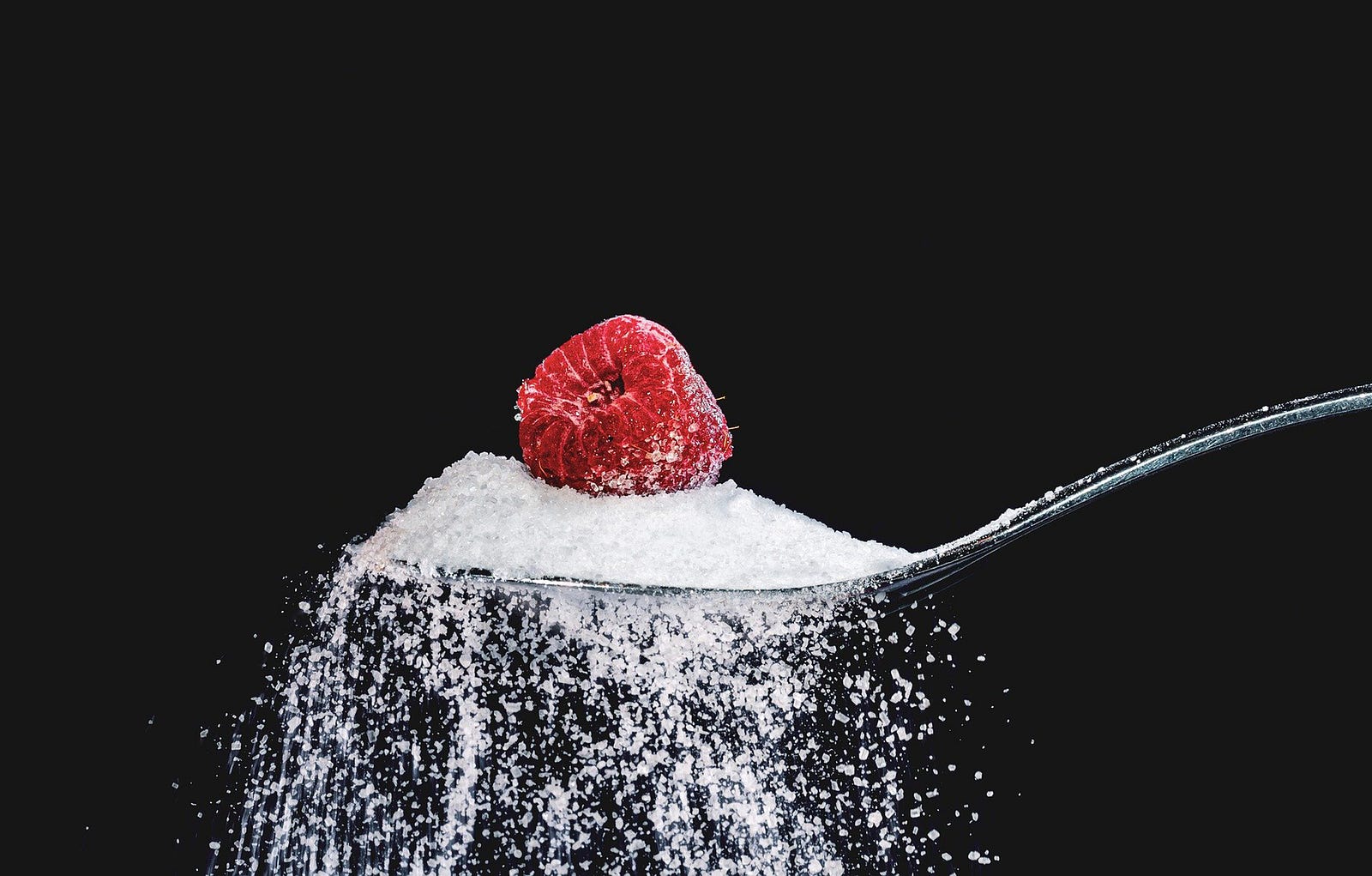A SUGAR REPLACEMENT KNOWN AS ERYTHRITOL (pronounced Ear-rith-ri-tall) appears to be associated with cardiovascular risk and premature death for high-risk individuals. The additive is sometimes used to bulk or sweeten monk fruit, stevia, or keto-reduced sugar products. Today we look at sugar replacement risks, including heart attacks, strokes, and blood clots.
Here’s my takeaway message: If you have existing cardiovascular risk factors (for example, diabetes), you might double your risk of a heart attack or stroke if you have high blood levels of erythritol (compared with those with the lowest levels).
Today we look at the disturbing (but preliminary) results of a recently published study in Nature Medicine.
“One cannot think well, love well, sleep well, if one has not dined well.”
― Virginia Woolf, A Room of One’s Own
What is erythritol?
Erythritol is a sugar alcohol that is a sugar substitute in many foods and beverages. It is a type of carbohydrate that occurs naturally in some fruits, mushrooms, and fermented foods. Erythritol is produced commercially by fermenting glucose with yeast or other microorganisms, which converts the glucose into erythritol.
Erythritol is about 70 percent as sweet as table sugar (sucrose) but has almost no calories and does not raise blood sugar levels. It also has a lower glycemic index than sugar, which causes a slower and lower rise in blood sugar levels. This lower-glycemic makes it a popular sugar substitute for people managing their blood sugar levels or reducing their calorie intake.

Erythritol has a cooling sensation on the tongue and can have a slightly bitter aftertaste in high concentrations. However, it is generally considered safe and approved as a food additive in many countries, including the United States and the European Union.
What foods contain erythritol?
Erythritol is commonly used as a sugar substitute in many foods and beverages. Here are some examples:
- Sugar-free gum and mints
- Low-calorie and sugar-free drinks and juices
- Baked goods such as cakes, cookies, and bread
- Sugar-free jams and jellies
- Dairy products such as ice cream and yogurt
- Chocolates and candies
- Salad dressings and sauces
Erythritol can also be used as a table sweetener or with other sweeteners such as stevia or monk fruit extract.
It is worth noting that while erythritol is a popular sugar substitute, it may not be suitable for everyone, especially those with irritable bowel syndrome (IBS) or digestive issues, as it can cause gastrointestinal symptoms in some people when consumed in large amounts.
Sugar replacement risks
While many of us consume artificial sweeteners as sugar substitutes, we don’t know much about the long-term effects on cardiometabolic disease risk. Researchers recently examined the sugar substitute erythritol and have raised some early alarms.
The researchers aimed to find chemicals in a person’s blood that might predict cardiovascular problems. For the study, they examined blood erythritol levels of approximately 4,000 individuals (mostly over 60) in Europe and the United States. All had heart disease or were at high risk because of conditions such as high blood pressure or diabetes.
Research findings
Subjects with the highest blood concentration of the sugar substitute were more likely to have a stroke or heart attack.
The researchers confirmed the results using blood from a separate pool of over 2,100 patients in the United States and 833 from Europe. About three out of four in the study had coronary artery disease or high blood pressure. Approximately one in five had diabetes, and over half were males in their 60s and 70s.
In all of the populations tested, researchers discovered higher levels of erythritol were linked to a higher chance of suffering from a stroke, heart attack, or death within three years.

Why is erythritol associated with poorer outcomes? Blood clots?
To better understand why erythritol might be associated with poorer outcomes, the scientists turned to mice. They found that mice who consumed erythritol had more blood clots. Moreover, erythritol appeared to induce clotting in humans, too.
The scientists took one more step. They had eight healthy volunteers consume a beverage with 30 grams of erythritol, an amount many Americans take in. according to the National Health and Nutrition Examination Survey, which examines American nutrition each year.
Three days of blood testing showed that thirty grams were sufficient to raise blood levels of erythritol by a thousandfold.
Blood tests over the next three days tracked erythritol levels and clotting risk. The levels stayed above the threshold for triggering clots for two to three days. The researchers got my attention when they observed that a pint of keto ice cream has about 30 grams of erythritol.
Why sugar replacement causes risks
The researchers sought to find chemicals in a person’s blood that might predict the risk of a future cardiovascular event (such as a stroke, heart attack, or death in the ensuing three years). They discovered the sweetener erythritol appeared to play a villain’s role, possibly through blood clot promotion (thrombosis).
While humans naturally create the chemical, we have only very low amounts that would not account for the levels found in study participants’ blood.
We must form clots or bleed to death from cuts and other injuries. Internally, as our blood vessels spring leaks, blood platelets plug these holes. But the clot size depends on the trigger size stimulating the platelets. A trigger that is small causes a small clot.
Now it gets more interesting: The platelets become extraordinarily responsive with erythritol, with a small stimulation resulting in a large clot. For those at outsized risk of suffering from a cardiovascular event, this might translate into erythritol raising this risk.
Writing in the New York Times, Tufts University cardiologist and professor of nutrition Dariush Mozaffarian observes that “[erythritol] isn’t innocuous. Moreover, there haven’t been enough studies to determine the long-term health effects of sugar substitutes in humans.” He adds: “That’s the problem. Regardless of this study, there’s just not been enough evidence that they’re really safe.”

Some caveats
The study demonstrates only correlation, not causation. Moreover, it primarily focused on individuals already at higher risk of suffering from a heart attack, stroke, or premature death.
If I were in a high-risk group, I might think twice about consuming erythritol. However, we need confirmatory studies. I will look at keto ice cream nutrition labels the next time I visit my local supermarket.
There is no accepted daily intake set by the European Food Safety Authority or the US Food and Drug Administration, which considers erythritol generally recognized as safe (GRAS).
And there is this counter: We must balance any possible (and unconfirmed) risks of excess erythritol against the known perils of too much glucose consumption.
Nevertheless, given its widespread availability, I hope we get more studies looking at erythritol.
What Is Erythritol?
Though it sounds new, erythritol (ear-RITH-ri-tall) has been around as long as grapes, peaches, pears, and watermelon.www.webmd.com
The information I provided in this blog is for educational purposes only and does not substitute for professional medical advice. Please consult a medical professional or healthcare provider for medical advice, diagnoses, or treatment. I am not liable for risks or issues associated with using or acting upon the information in this blog.
Thank you for joining me in examining sugar replacement risks.




